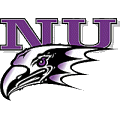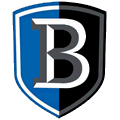Niagara

Nickname: Purple Eagles
Location: Lewiston, NY
Founded: 1856
Conference: Atlantic Hockey
National Championships: 0
Last NCAA Appearance: 2008
Last Frozen Four: None
Coach: Dave Burkholder (10th season)
2009-10 Record: 12-20-4 (6-10-2 CHA, 3rd place)
Series: Niagara leads, 4-1-0
First Game: November 15, 1997 (Troy, NY)
Last RPI win: November 15, 1997 (Troy, NY)
Last NU win: November 18, 2009 (Lewiston, NY)
2010-11 game: October 23, 2010 (Troy, NY)
Key players: F Bryan Haczyk, sr.; F Paul Zanette, sr.; F Marc Zanette, so.; F Ryan Murphy, fr.; D C.J. Chartrain, so.; D Jason Beattie, so.
No, you aren't reading that incorrectly - since the Engineers triumphed over the Purps in their first meeting in 1997, Niagara has won four consecutive matchups against the Engineers. That includes last season's game in Lewiston, an odd affair in which a rash of injuries, a pair of key benchings, and a midweek road trip against a non-league opponent combined to create probably the worst game of the season for RPI.
Niagara is far better known in the Capital District as one of Siena basketball's bigger rivals within the MAAC, but their hockey prowess, especially considering that they are one of the newest D-I varsity programs in the country, is something most people are less aware of.
The lone RPI victory over the Purple Eagles came in Niagara's second season of varsity hockey, their final probationary year before their official entry into Division I as an inaugural member of College Hockey America. In those first two seasons, the Purps filled gaps in their independent schedule with Division III programs, but they impressed in turning in a pair of winning seasons. NU chose to be part of the CHA after declining to join the nascent MAAC hockey conference despite the school's MAAC membership in its other sports - they did not want to be constrained by the MAAC's restrictions on scholarships which still exist in Atlantic Hockey today.
Niagara's best season to date by far was only their fourth as a varsity program. In 1999-2000, under the tutelage of Blaise MacDonald, the program's first head coach, the Purple Eagles dominated the CHA and racked up plenty of eye opening non-conference wins as well, including a win in Lewiston against an Engineers squad that was ranked fifth in the nation at the time. The team swept the CHA regular season and tournament titles on their way to a 29-7-4 record which saw them becoming the first - and to date, only the second - team from a conference outside of the WCHA, CCHA, ECAC, and Hockey East to earn an at-large bid to the NCAA tournament, a feat all the more impressive when you consider the fact that the tournament only included 12 teams at that time.
But the impressive Purple Eagles didn't stop there. They famously won their very first NCAA tournament game, dropping a heavily favored New Hampshire team, 4-1, in what was at the time considered one of the biggest upsets in the history of the tournament.
Niagara would drop back the next year, suffering their first losing season as a varsity program, and MacDonald would depart for UMass-Lowell at the conclusion of the year. Since then, under Burkholder, NU has never truly been out of the mix in the CHA, but they've never been the world-beaters that they were in 2000. 20-win seasons in 2004 and 2008 brought with them their second and third CHA tournament titles and trips to the NCAA tournament, and the Purple Eagles claimed the CHA regular season crowns in 2006 and 2007, but as the CHA endured hardships and struggles to maintain membership, those accomplishments were viewed with a decreasing amount of respect in the hockey world.
Last year, Niagara endured perhaps the worst season of their D-I existence, limping to only 12 wins and losing 20 games for the first time. It was, however, nearly resurrected at the last moment when NU shocked the college hockey world by shooting down high flying Bemidji State, who would have to settle for the CHA's second at-large bid to the NCAA tournament. Despite the rough season, the Purple Eagles ended up just an overtime goal away from the four-team CHA's final automatic tournament bid, losing to Alabama-Huntsville in overtime to end their season.
This season, Niagara takes the reluctant step of entering the league they spurned 12 years ago. With the CHA's long expected demise now a reality, the need for the safety of playing within a structured league with an automatic NCAA bid trumped NU's desire to offer a full complement of athletic scholarships. It's too early to tell what this will mean for Niagara's earned pedigree as a minor conference wildcard team - NU has won at least one game against a ranked opponent in every season since 2004, and only four seasons in their history where they didn't - but one thing is for sure: the Purple Eagles have declined in total wins in consecutive seasons for the first time in their history. Either they're on the decline, or they are due for a better season.
Unfortunately for Niagara, they will have a lot of holes to plug after an already difficult season. Their top three scorers last season were all seniors, including Chris Moran, easily the team's best passer with 33 assists, which by itself would have tied him as the team's leading scorer. Senior Paul Zanette returns with 11 goals and 10 assists last season, Haczyk and Paul's younger brother Marc are the returning forwards with the best numbers last year. A glance at NU's incoming freshmen shows a profile similar to RIT's - a lot of older recruits, perhaps the most impressive being Murphy, who put up 31 goals and 41 assists in 48 games for Oakville of the OJHL last season. He will be 21 by the time the season opens.
Defensively, the Purps were rough last year. Each of their three goaltenders got some significant playing time last season, and all ended the year with GAAs over three and save percentages hovering around just 90%. As a team, NU posted a GAA of 3.28.
The Engineers are going to need to take full advantage of their offensive and defensive advantages when the Purple Eagles come into town on the back end of a pseudo-travel partner weekend, as RIT and Niagara will swap between the Capital District pairing in late October. On both sides of the puck, RPI will undoubtedly be boasting better individual talent than Niagara, and playing well as a team will be the key to snapping the program's 4-game losing stream against NU. Perhaps even a reminder of the embarrassing loss suffered at Dwyer Arena last season might spark the Engineers to a Saturday night win - a win that could have the makings to be decisive if they play to potential.
At any rate, unless injuries and benchings are the story of the night for a second straight season, this is a game RPI should be winning and the difference in the team's play between last year's loss and this year's game will, to a small degree, be illustrative of the differences between the two RPI teams.









